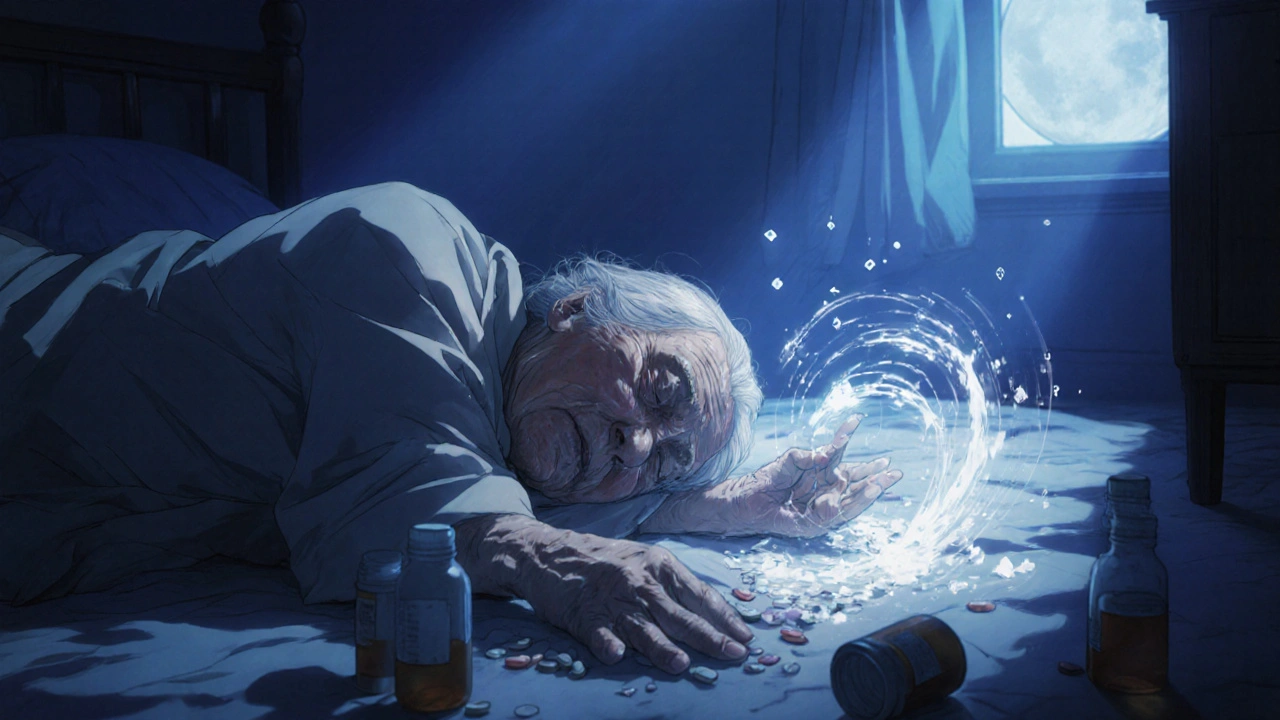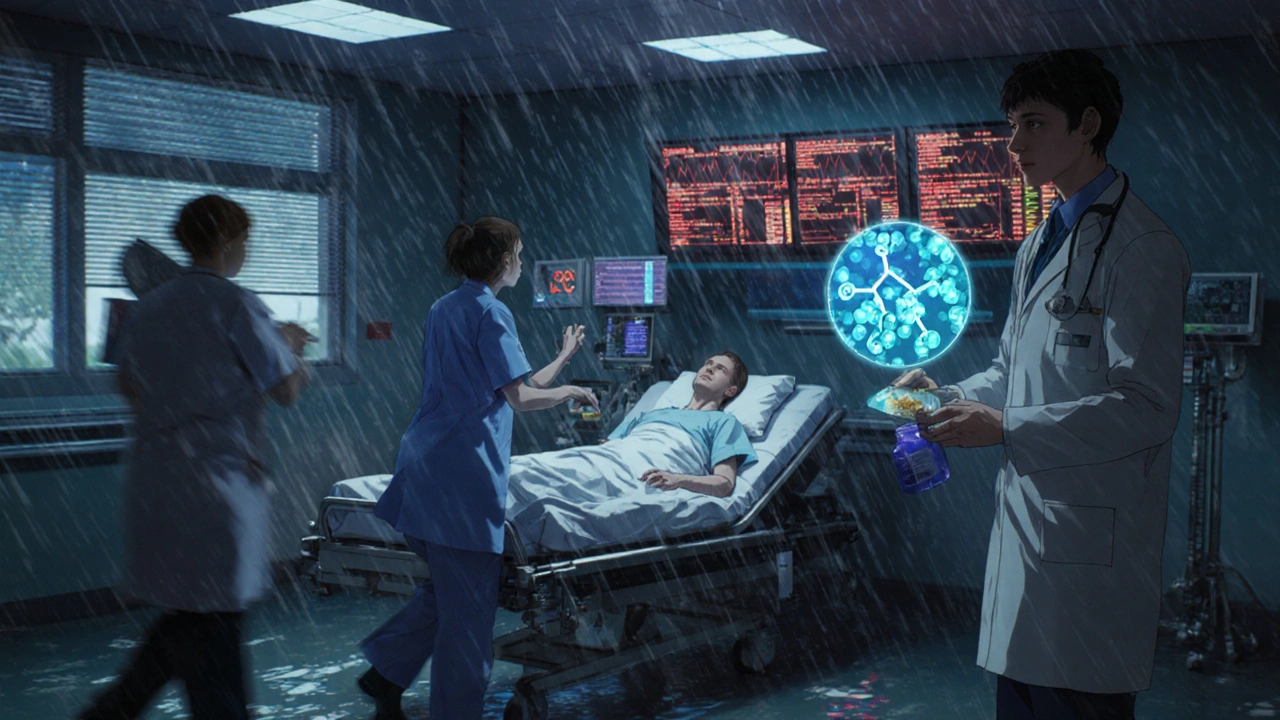Oxcarbazepine Overdose: Signs, Risks, and What to Do

More than 1.2 million people worldwide take oxcarbazepine for epilepsy or nerve pain. Most use it safely. But when too much is taken-accidentally or on purpose-the body can’t handle it. An overdose isn’t always obvious. It doesn’t always look like a movie scene with someone collapsing. Sometimes it starts with a headache, dizziness, or nausea. And if you don’t recognize it early, it can turn dangerous fast.
What Happens When You Take Too Much Oxcarbazepine?
Oxcarbazepine works by calming overactive nerve signals in the brain. That’s why it helps with seizures and trigeminal neuralgia. But when you take more than your body can process, those same calming effects become too strong. Your central nervous system slows down. Your heart rate drops. Your coordination goes. Your brain struggles to send signals to your muscles and organs.
The active ingredient, oxcarbazepine, breaks down in your liver into licarbazepine. Both compounds affect sodium channels in neurons. Too much means too many channels stay closed. That’s what causes the symptoms: slow brain activity, weak muscles, confusion.
Studies show that doses above 12,000 mg in adults can lead to severe toxicity. But people have overdosed on as little as 3,000 mg-especially if they’re older, have liver problems, or take other medications that interact with oxcarbazepine.
Common Signs of Oxcarbazepine Overdose
These are the most frequently reported symptoms in emergency rooms:
- Severe drowsiness or inability to stay awake
- Slurred speech or trouble forming words
- Loss of coordination, stumbling, or falling
- Nausea, vomiting, or stomach pain
- Dizziness or vertigo
- Blurred or double vision
- Low blood pressure
- Slow or irregular heartbeat
- Confusion or memory loss
- Seizures (yes, the drug meant to stop them can trigger them in overdose)
In extreme cases, people slip into a coma. Respiratory depression can happen-breathing becomes shallow or stops. This is life-threatening.
One real case from the Journal of Medical Toxicology in 2023 involved a 68-year-old woman who took 9,000 mg thinking it would help her insomnia. She was found unconscious at home. Her heart rate was 38 beats per minute. Her sodium levels dropped to 121 mmol/L (normal is 135-145). She spent four days in intensive care.
Why Sodium Levels Drop-And Why It’s Dangerous
One of the most serious risks with oxcarbazepine overdose isn’t just sedation. It’s hyponatremia-dangerously low sodium in the blood.
Oxcarbazepine interferes with how the kidneys handle water. Instead of flushing out extra fluid, your body holds onto it. That dilutes the sodium in your bloodstream. When sodium drops below 120 mmol/L, brain cells swell. That’s when you get seizures, hallucinations, or brain damage.
This risk is higher in older adults, people on diuretics, or those who drink a lot of water while taking the drug. Even a small overdose can trigger this. A 2022 review in Neurology Clinical Practice found that nearly 40% of oxcarbazepine overdose cases involved clinically significant hyponatremia.
What to Do If You Suspect an Overdose
If someone shows signs of overdose, don’t wait. Don’t try to make them vomit. Don’t give them coffee or water to ‘wake them up.’
- Call emergency services immediately. In Australia, dial 000.
- If they’re unconscious but breathing, place them in the recovery position-on their side, head tilted back.
- If they’re not breathing, start CPR if you’re trained.
- Bring the pill bottle or packaging with you to the hospital. It helps doctors know the exact dose and formulation.
Emergency teams will monitor heart rate, breathing, and blood pressure. They’ll run blood tests to check sodium levels, kidney function, and drug concentration.

How Hospitals Treat Oxcarbazepine Overdose
There’s no specific antidote for oxcarbazepine. Treatment is supportive. That means:
- IV fluids to maintain hydration and help flush the drug out
- Sodium correction for hyponatremia-slowly, to avoid brain damage
- Activated charcoal if the overdose happened within the last hour
- Monitoring in an ICU for severe cases
- Medications to control seizures if they occur
Some patients need dialysis, especially if they have kidney failure or extremely high drug levels. But most people recover fully within 24 to 72 hours with proper care.
Who’s Most at Risk?
Not everyone who takes too much oxcarbazepine ends up in the hospital. But certain groups are far more vulnerable:
- Children and teens-accidental overdoses happen when pills are left out
- Older adults-slower metabolism, more sensitivity to sodium changes
- People with liver or kidney disease-can’t clear the drug efficiently
- Those mixing it with alcohol, benzodiazepines, or other CNS depressants
- People with depression or suicidal thoughts-intentional overdose is a known risk
A 2024 Australian study found that 22% of oxcarbazepine overdose cases in Tasmania involved people over 65. Nearly half had a history of depression or anxiety.
How to Prevent an Overdose
Prevention starts with smart habits:
- Keep pills in a locked cabinet, especially if kids or teens are in the house
- Use a pill organizer with alarms-don’t rely on memory
- Never take extra doses to make up for a missed one
- Don’t combine with alcohol, sleep aids, or painkillers without talking to your doctor
- Get regular blood tests if you’re on long-term therapy-check sodium levels every 3-6 months
- Tell all your doctors you take oxcarbazepine-many don’t ask
If you’re thinking about taking more than prescribed, talk to someone. A pharmacist, a counselor, a doctor. You’re not alone. There are better ways to cope.

Recovery and Long-Term Effects
Most people who survive an oxcarbazepine overdose make a full recovery. But some have lasting issues:
- Memory lapses or trouble concentrating
- Balance problems or dizziness that lasts weeks
- Changes in mood or increased anxiety
- Rebound seizures if the drug is stopped abruptly
Recovery isn’t just physical. Many people feel guilt, shame, or fear after an overdose. Follow-up care with a neurologist or mental health professional is critical. Don’t skip it.
Frequently Asked Questions
Can you overdose on oxcarbazepine by taking too many pills at once?
Yes. Taking more than prescribed-whether accidentally or intentionally-can lead to overdose. Doses above 3,000 mg in adults have caused serious symptoms. The lethal dose isn’t clearly defined, but toxicity starts well below 10,000 mg. Never take extra doses to catch up.
Does oxcarbazepine overdose show up on a drug test?
Standard drug screens don’t test for oxcarbazepine. But hospitals can run specialized blood tests to detect it if overdose is suspected. These tests are done in emergency settings, not routine screenings.
Is it safe to drink alcohol while taking oxcarbazepine?
No. Alcohol increases the sedative effects of oxcarbazepine and raises the risk of overdose-even if you’re taking your normal dose. Mixing them can cause extreme drowsiness, breathing problems, or loss of consciousness.
How long does oxcarbazepine stay in your system?
The half-life of oxcarbazepine is about 9-11 hours. Its active metabolite, licarbazepine, lasts longer-around 20-25 hours. In overdose, it can take 2-4 days for the body to fully clear it, especially if kidney or liver function is impaired.
Can you die from an oxcarbazepine overdose?
Yes, but it’s rare. Death usually happens when breathing stops due to extreme CNS depression or when severe hyponatremia causes brain swelling. Most deaths occur when treatment is delayed. Quick medical care greatly improves survival.
What Comes Next?
If you or someone you know has had an overdose, recovery doesn’t end at the hospital. Follow-up care matters. Talk to your doctor about adjusting your dose or switching medications. Consider counseling if depression or anxiety played a role. Ask for a medication review with your pharmacist-they spot dangerous combinations others miss.
Oxcarbazepine saves lives. But like all powerful medicines, it demands respect. A single mistake can change everything. Stay informed. Stay cautious. And if you’re unsure-ask. Someone is always ready to help.
Camille Mavibas
October 28, 2025 AT 01:24Just took my meds and read this… holy crap. I never realized how sneaky this stuff can be. 😅 I thought dizziness was just me being tired. Guess I’m getting my sodium checked next week.
ANDREA SCIACCA
October 29, 2025 AT 18:57Oh wow so this is why my cousin ended up in the ER last year?? She said she ‘just took an extra pill to sleep’ and woke up in a hospital with IVs everywhere?? 🤯 America’s healthcare system is a circus but at least someone wrote this right. #OxcarbazepineIsNotSleepAid
Adam Walter
October 30, 2025 AT 17:13Let’s talk about hyponatremia for a sec-this isn’t just ‘a side effect,’ it’s a silent assassin. Sodium isn’t just for chips and fries; it’s the spark plug for your neurons. When it drops below 120, your brain starts swelling like a balloon in a hot car. And doctors? They’re terrified to correct it too fast-because then you get central pontine myelinolysis, which is basically your brain’s white matter turning to toast. It’s not a myth. It’s in the textbooks. And yes, it’s happened to people who thought ‘I’ll just take two more to feel better.’
Also, don’t trust drug tests. Standard panels don’t catch this. If you’re in the ER and they’re not testing for licarbazepine, ask. Politely. But ask. Your life might depend on it.
And to the folks who say ‘it’s just an antiseizure med’-it’s not. It’s a neuromodulator with a narrow therapeutic window. Treat it like lithium. Or insulin. Not like Advil.
And yes, I’ve seen it. I’ve seen the numbers. I’ve held the chart. Don’t gamble with this.
Shubham Singh
October 30, 2025 AT 20:48This is why I hate how casually people treat prescriptions in the West. In India, we know better. Our grandparents didn’t have fancy meds, but they knew: one pill, one time. Not ‘I’ll take two if I’m stressed.’ You think you’re being smart? You’re just playing Russian roulette with your brain. And now you’re reading this because someone almost died because of your ‘little mistake.’
Hollis Hamon
October 31, 2025 AT 04:09Thanks for writing this. I’ve been on oxcarbazepine for 8 years. Never had an issue. But I do get my sodium checked every 4 months. I also keep my pills in a locked box. My mom had dementia and once took three days’ worth thinking they were vitamins. I don’t want that to happen to me-or anyone else. Simple habits save lives.
Gurupriya Dutta
October 31, 2025 AT 18:38I’m a nurse in Mumbai. We had a 72-year-old man come in last month with a 6,000 mg overdose. He said he was ‘trying to calm his nerves’ after his wife passed. He had hyponatremia at 118. He’s fine now, but he cried for two days after he woke up. Not from the meds-from guilt. This isn’t just medical. It’s emotional. We need more of this kind of info out there.
Michael Lynch
November 1, 2025 AT 07:11Kinda wild how a drug meant to stabilize your brain can flip and destabilize it if you mess with the dose. Like a car with cruise control that suddenly hits the brakes too hard. I used to think overdoses were dramatic-people screaming, foaming, collapsing. But this? Quiet. Slow. Creeping. That’s what makes it scarier.
caroline howard
November 1, 2025 AT 08:15So let me get this straight: you take a pill to stop seizures… and then you take too many… and you get seizures? 🤦♀️ That’s like using a fire extinguisher to start a fire. I mean… congrats? You broke the system. Now go tell your doctor you’re not a scientist.
Melissa Thompson
November 1, 2025 AT 13:19Of course this is happening-because Americans treat medication like candy. We don’t respect science. We don’t respect dosage. We don’t respect the fact that biology isn’t a Netflix binge-you can’t just ‘watch one more episode.’ This isn’t a ‘personal freedom’ issue. It’s a failure of education. And yes, I’m from the U.S., and I’m embarrassed. We need mandatory pharmacist consultations. Now.
Rika Nokashi
November 1, 2025 AT 22:38It is truly tragic that people in the West do not understand the sacredness of medicine. In our tradition, even a single grain of rice is offered with reverence. But here? Pills are treated like candy. And then people wonder why they end up in ICU. This is not just about sodium-it is about humility. The body is not a machine to be hacked. It is a temple. And when you disrespect the temple, you pay the price. I have seen many such cases in India. The same outcome. The same arrogance. The same regret.
Don Moore
November 2, 2025 AT 18:20For those reading this: if you are considering increasing your dose due to emotional distress, please reach out to your prescriber. There are safer, evidence-based ways to manage anxiety and sleep. Medication adjustments are not DIY projects. Your doctor is there to help-not judge. Please use them.
Austin Levine
November 3, 2025 AT 02:42Hyponatremia is the real villain here. Not the drug. The dose.
Matthew King
November 4, 2025 AT 11:49my roommate took 20 pills once bc he thought it’d help his panic attack… woke up in the hospital with a catheter and a new fear of his own brain. never again. just… don’t.
Andrea Swick
November 6, 2025 AT 07:10I’ve been on this for 12 years. I had a bad reaction once-sodium hit 128. I didn’t even feel it until my hands started tingling. Now I have a little tracker on my phone that reminds me to get bloodwork every 12 weeks. And I always tell new doctors I’m on it. Most forget to ask. But I don’t blame them. I blame the system. It’s not your fault. It’s not mine. It’s just… broken. But we can fix it by talking. So thank you for this. Really.